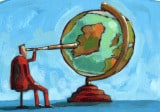Top companies need top chairmen writes John Harty, as he outlines the qualities required to make it at the top level.
The Top 100 Companies in Ireland issue of Business & Finance is about acknowledging the very best businesses across Ireland. It acts as testimony to the wealth and depth of thriving business in this country. When you look a little closer at these corporations you begin to see that behind every great company there is a great board; and behind every great board there’s an outstanding chairman. But what makes a great chairman and what kind of challenges must he/ she overcome in today’s volatile corporate environment? We recently conducted an extensive study to answer just such questions and we came up with some very interesting findings.
Let’s begin by looking at some of the challenges:
1) Regulation and time
The responsibilities of the chairman have increased manifold in the past 10 years. Increased regulation and the introduction of more stringent codes of governance mean the role of the chairman now goes far beyond simply acting as a sounding board for the CEO and a moderator at board meetings.
Today’s chairman must manage multiple relationships and be held accountable for creating an environment amongst the board and executive team that is conducive to the strategic success of the organisation. Fulfilling this ever more complicated role takes more time than it did in the past and so the modern day chairman must be an astute time manager. Ensuring regulatory and governance requirements are adhered to and managing the time of the board is going to become more challenging for the chairman in years to come.
2) Attracting top talent
It’s not just the chairman’s role that has become more onerous. The responsibilities of NEDs and INEDs have increased significantly too. Add to this heightened competition for the most talented people across all sectors and the challenge for the chairman to attract the most capable, suitably qualified directors to the board.
There has been much talk of remuneration in recent years and while this is important and should match the level of risk associated with the position that is to be filled it is not the only factor that must be considered. Going beyond it the chairman must create an attractive environment at the boardroom. Most prevalent amongst the innate qualities the chairman needs to possess to overcome these and the challenges of today’s role are:
3) Leadership
First and foremost the chairman’s role is about leadership; leading the board and taking charge of meetings to ensure their effectiveness and maintaining focus on the company’s strategic direction. However, this isn’t a 1980s, bullish Wall Street type of leadership. Far from it; it’s about support and challenge, creating a team environment, listening and allowing all views to be heard and considered.
This leadership quality pervades every aspect of the chairman’s role and earns the respect of both executives and non-executives, allowing the chairman to set the tone of the board to which all members must adhere. With time becoming an ever more valuable commodity this is hugely important if issues are to be correctly addressed and ‘group-think’ is to be avoided.
4) Communication
Perhaps a tangent of leadership is the chairman’s unrivalled ability to communicate. It must be remembered that the chairman acts as a bridge between numerous stakeholders. There’s the executive team, the non-executives, the shareholders and in financially regulated entities there’s also the Central Bank. Much of the chairman’s communication with these various stakeholders takes place behind the scenes, be it in the form of one-to-one catch ups, group meetings or digital correspondence.
Maintaining these lines of communications builds trust, promotes clarity and transparency and offers the chairman a more detailed understanding of the concerns of those involved so that they may be addressed before they become an issue for the organisation.

John Harty, managing director, Harty International
5) Delegation
With constantly increasing regulation and governance the chairman must manage both his/ her time and the time of the board as effectively as possible. To do this they must be able to delegate tasks and responsibilities to those best equipped to manage them. The development of effective, balanced committees is essential to this.
Risk and audit committees can oversee a significant amount of the company’s governance duties, reporting their recommendations to the board for consideration.
This frees up much needed time for the board to focus on the corporation’s strategy.
… the role of the chairman now goes far beyond simply acting as a sounding board for the CEO





